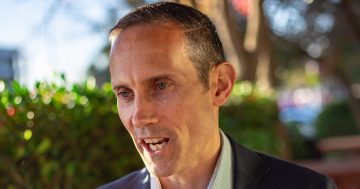
Assistant Minister for Competition, Charities and Treasury and self-confessed “stats nerd” Dr Andrew Leigh. Photo: Ian Bushnell.
Australian Bureau of Statistics (ABS) staff have heard how they will play a crucial role under the new government in ensuring policy proposals are all they are cracked up to be.
New Assistant Minister for Competition, Charities and Treasury and Member for Fenner Dr Andrew Leigh told staff that Labor’s plan to establish an Evaluator General to assess whether policy ideas were effective would rely on their expertise, particularly in an era of declining household survey response rates.
Dr Leigh said an Evaluator General and access to big data would enable the government to measure the outcomes of policies without the additional cost of running bespoke surveys.
“You’ll be absolutely critical in that mission to measure what matters,” he said.
“At the moment, I worry that too often we have government programs that are set up based on the gut intuition of policymakers, rather than a really evidence-based grounding on what works.
“We carefully evaluate new pharmaceuticals and new medical treatments, and we should take more of that scientific and political approach to policymaking.
“To do that will require the work you do being brought in and integrated with public policy, and the linkages you have with departments and other agencies will be absolutely critical.”
Labor has also pledged to apply a wellbeing framework to policy, as is done in New Zealand, plus help address mental health, poverty and inequality while also providing real-time insights into the economy.
Dr Leigh said he would be talking to the ABS about how to do this.
“You’ve got a strong tradition of having done that through Measures of Australia’s Progress, and many of the social inclusion indicators,” he said.
“As a keen egalitarian and somebody who has written a book on social capital and struggled sometimes to find the right metrics for measuring the strength of community, I’m really keen to have a conversation with the Australian Bureau of Statistics. [We need to discuss] how we can do a better job of measuring the health of community and looking at the way in which Australia’s income distribution is shaping up.”
Dr Leigh’s speech also reaffirmed the role of statistics in democratic government and sought to reassure ABS staff that the new government valued their contribution.
After the Census debacle of 2016 and job cuts in recent years that have contributed to the ABS having to pare back some of its work, Dr Leigh’s words would have been welcome, along with Labor’s general pledge to rebuild public service capability.
Dr Leigh said he admired how the ABS pivoted during the pandemic to provide regular real-time data. He said it was critical public policymakers had a better sense of how businesses and households were travelling.
“I’ve written research using your provisional mortality statistics, which are extraordinary,” Dr Leigh said.
“The notion you’ve now produced for us on a weekly basis mortality data as recent as 2021 is a real testament to the hard work of people in the room and the way in which you’ve engaged with the state and territory governments.”
He said the ABS was now a much more outward-looking institution than it had ever been, working with so many partner agencies and addressing some of the challenges the nation faced.
As a self-confessed “stats nerd”, Dr Leigh said he was thrilled to have responsibility for the Bureau of Statistics.
“I do so with a huge respect for the work that you all do. As you know, the great maxim ‘what gets measured gets managed’ really holds up,” he said.
“You determine many of the key things that Australians focus on. You shape the national conversation around inflation, unemployment and growth, but also deeper conversations too about the social statistics – about how we’re tracking as a country in terms of our environmental measures, the social health in the nation, the levels of trust.
“It’s no coincidence that when dictators come to power, one of the first things they seek to do is to undermine their country’s statistical agencies. Because the one thing that a dictator can’t abide is an independent agency which really tells it like it is.”





















